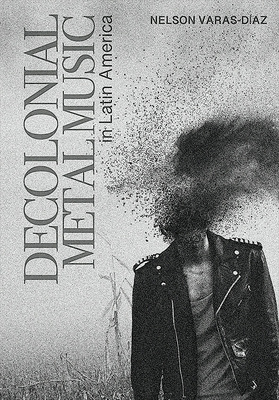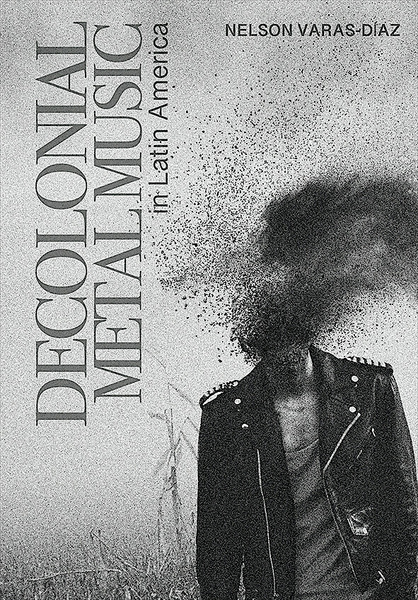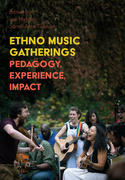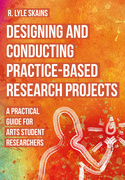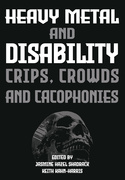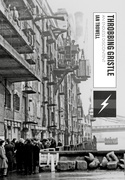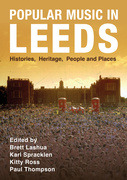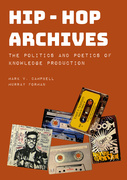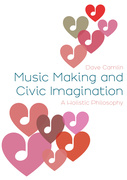Decolonial Metal Music in Latin America (Book)
Nelson Varas-Díaz engages in ethnographic work throughout Latin America to explore how heavy metal music is used to challenge the region’s colonial past and present. Through extensive research in nine countries, his work documents how this musical genre allows listeners and musicians to engage in what he calls ‘extreme decolonial dialogues’ that challenge historical and ongoing forms of oppression. 30 b/w illus.
Edition
The long-lasting effects of colonialism are still present throughout Latin America. Racism, political persecution, ethnic extermination and extreme capitalism are some salient examples. This new book explores how heavy metal music in the region has been used to critically challenge the historical legacy of colonialism and its present-day manifestations.
Through extensive ethnographic research in Puerto Rico, Cuba, Dominican Republic, Mexico, Guatemala, Colombia, Peru, Chile and Argentina, Varas-Díaz documents how metal music listeners and musicians engage in ‘extreme decolonial dialogues’ as a strategy to challenge past and ongoing forms of oppression. This allows readers to see metal music in a different light and as a call for justice in Latin America.
Heavy metal related scholarship has made strides in the past decade. Many books have aimed to explain its origins, uses and the social meanings ascribed to the music in a variety of contexts. For the most part, these have neglected to address the region of Latin America as an area of study.
It represents a historical and sociological journey in Latin American heavy metal music through rich ethnographic engagements with performers, fans and scholars of music. Its central premise is the dialogic relationship amongst deep histories of coloniality, systematic oppression, entrenched inequalities and the expressive forms generated by ‘decolonial metal music’. The book also provides an exemplary and potentially iconic model of ethnomusicology and the anthropology of music.
Most previous work on metal music in Latin America has relied on theoretical frameworks developed in the Global North, and is therefore limited in understanding the region through its particular history and experiences. There is no scholarship of heavy metal scholarship in the Latin American region that achieves the depth or breadth of analysis represented by this book. It provides a roadmap and a model for this emerging mode of musical analysis, by demonstrating how decolonial metal scholarship can be achieved.
Academic readership for the book will come from multiple disciplines including cultural studies, musicology, ethnomusicology, sociology, anthropology, cultural geography, history and Latin American studies. It will be of interest to music studies programmes, as well as for methods courses on structurally informed social research. The book will also be of interest to those outside academic settings – accessibly written, with its concise reviews of historical and political-economic contexts, and its vivid storytelling, it will be of interest to consumers of the metal musical genre.
Dr Nelson Varas-Díaz is a professor of social-community psychology at Florida International University’s Department of Global and Sociocultural Studies. His work related to metal music addresses issues of community formation, linkages between culture and music, and metal music as a decolonial strategy in Latin America.
Preface
Chapter 1
Metal music’s decolonial role in Latin America
Chapter 2
Colonialism is still here / Metal is still here – Puerto Rico
Chapter 3
The experience and sound of ethnic extermination – Peru
Chapter 4
Dictatorship/resistance/inspiration – Chile
Chapter 5
Social movements and hybrid sounds – Mexico
Chapter 6
Decolonizing space and culture amidst revolutionary entanglements – Cuba
Chapter 7
Navigating racism, classism, and complex airwaves – Dominican Republic
Chapter 8
Restoring memory and surviving violence – Colombia
Chapter 9
Education for the very few – Guatemala
Chapter 10
An elusive word? Aguante as a decolonial reflection – Argentina
'As heavy metal is diversifying within a music culture in which active fan participation is crucial in cementing its longevity, these books are not just an excellent read for casual metal fans, but important for present and future heavy music scholars. [...] These books demonstrate not just how the music is produced and performed within non-Western countries, but also how the genre and culture serve to strengthen the global heavy music community.'
Reviewed alongside Living Metal
'Varas-Díaz’s masterful book proves that in Latin America, the sonic intensity of metal music fuels an incendiary passion for social justice.'
'Until now, Latin American metal music scholars have not been critical of their field’s unequal position vis-à-vis the Global North. In addition to consolidating a starting point for his Latin American colleagues, Varas-Díaz provides a tool for researchers from distant countries to get closer to Latin American realities through a decolonial perspective. The great descriptive richness, product of the author's ethnographic work, allows readers to embark on an imaginary journey through different Latin American metal scenes and listen to the voices and subjective experiences of their metalheads.'
'Decolonial Metal Music in Latin America is truly remarkable in the rigor and scope of its scholarship, while remaining anchored in the poignant, eloquent, and transformative stories that circulate around decolonial metal music in Latin America.'

